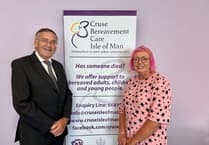A charity that helps to match school leavers with employers is about to launch a website designed to give young people lots of information about the world of work.
Junior Achivement’s Just the Job will have information about the types of jobs available and give advice about applying for jobs.
The charity’s chief executive officer, Sue Cook, said: ‘When we interviewed young people they said they felt there was nowhere to find out what careers existed in the Isle of Man because everything is UK-centric.
‘Taking everything they’ve said to us about not being able to read job descriptions, we’ve spent 12 months putting together this website which will feature all the industries in the Isle of Man.
‘It will feature jobs for young people from the age of 14 to 25, including volunteering opportunities and all our knowhow about how to get a job.
‘They will be able to go on our site and see how to put a CV together, get through an interview, how to start their own business.’
The Z-Zurich Foundation is funding it for three years.
‘Not only have they given us the money to develop the website, they’ve given us the resource to go behind it.’
Sue said she believed that it would be used by people of all ages to find out all sorts of information about the world of work in the Isle of Man.
‘We open the door at Junior Achievement,’ Sue said. ‘We don’t push them through it, they go through it themselves. It’s about creating opportunities. The single biggest opportunity I think is who you meet.
‘There is significant research in the UK to show that, when you’re in education, if you meet someone in business five or more times, you’re five times less likely to be unemployed.’
She said that they have to have ‘meaningful’ meetings for that to be true, for example work experience or taking part in a Junior Achievement programme.
‘It’s where they are being influenced by those business people. They are much more knowledgeable about what the world of work entails than somebody who has had none of those contacts.’
In 2021 the charity did a big piece of research with 300 people aged 17 to 24 who had been educated in the Isle of Man, across all six high schools. It asked them what needed to be done to help them make that link between education and employment.
Sue said: ‘We got some interesting feedback which helped shape the way we are moving.
‘Eighty per cent told us they would not apply for a job if they didn’t understand the job description.
‘They are self-excluding. A lot said they’d go into retail because they knew what retail was.
‘Seventy-five per cent of those young people not going on to university at that time felt more needed to be done to introduce them into the world of work in the Isle of Man.
‘That wasn’t necessarily a criticism of schools, it was just that schools are geared to moving them forward academically.
‘We asked them what was the skill they were most lacking and it was communication skills.
‘One of them said “social media has killed the art of communication” – I couldn’t have put it better myself.
‘So they know themselves what they are lacking.’
She said that many of the young people with whom the charity was now dealing had been affected by a number of factors.
The first was Covid and the effect on exams. The next was the teachers’ pay dispute, which meant extracurricular activities did not take place
‘The Department of Education is targeting its resource. It has to with its careers officers, who are really good.
‘But post-Covid they struggled to get work placements for the students. Businesses couldn’t cope with it. They had working from home and so on.
‘The work experience that happens in Year 10 (aged 14 and 15) has changed into a different system now.
‘You add that all up and what have got is a generation of young people who are not used to the work environment or developing those core skills.’
So what’s the way forward?
‘A lot of things are taking place in schools, which people don’t see,’ Sue said.
‘We introduced a programme last year with students not going to university called “career launch”.
‘That’s where we are going to schools and saying to young people “is there an industry on the Isle of Man that you’d like to explore?”
‘They try to line them up to meet someone in the industry and a walk around the business.
‘They have extra confidence doing that because they are not under the pressure of an interview. It has been really successful and resulted in job offers – but that was not the idea of it.’
This has led to the Just the Job website, which should not only benefit young people but the Isle of Man as a whole.
The Isle of Man has one of the oldest populations in the world. Indeed, 52% are not economically active.
Sue said that we need to get more people into the employment pool both earlier – from 14 upwards – as well as staying at work longer.
‘I went to Zurich [with the Just the Job website idea] and said we have a lot of challenges. We have a severe skill shortage in the Isle of Man.
‘My feeling is if we don’t do something about it, businesses will move off the island because they don’t have the people.
‘We need to bring our graduates back as well.
‘What young people are telling us is that they don’t know where to go to find this information.
‘There isn’t a one-stop shop to show them where to go.
‘There are some fantastic jobs in the Isle of Man. Doing this project meant I found out about jobs I didn’t know existed.
We’re talking all the industries across the board to showcase what is available.’
Volunteering will be added to the information supplied too. The whole site will use plain English, so it shouldn’t deter young people from using it.
The plan is to have experts whom young people could contact for more information about their industries.
‘We’re going to have to do a lot of work with employers because young people think very differently now,’ Sue said. ‘They have to write them in plain English. Sometimes I read job descriptions and I have no idea what the job is.’
•The charity is part of a worldwide organisation that has been nominated for a Nobel Peace Prize.
However, all the money raised in the Isle of Man stays in the Isle of Man.
Raising money for the charity isn’t easy.
Corporate sponsorship is one of the main ways of securing funding. For example, a wall in the training room has donors’ name on wooden seagulls.
The Department of Education also supports it.
‘We are reliant on 300 volunteers,’ Sue said. ‘Last year they donated in the region of 3,000 hours to go into schools to work with young people.
‘They are absolutely the single most important resource of the charity. Without them we wouldn’t have a charity.
‘They are the ones who are going in to schools and talking to students.’
Covid meant that the charity lost half of its volunteers as some worked from home, changed jobs or left the island.
Thanks to funding from the lottery, the charity was able to employ a volunteers’ organiser, who has now brought numbers up again.
‘I really want to appeal to businesses to get involved and get staff to volunteer,’ Sue said. ‘It’s a great developmental tool.’
•The charity is also running a ‘youth champion employer’ scheme, asking companies to sign up to a pledge to treat young people in a fair way.
Sue said: ‘For example, if someone applies for a job, the company should at least acknowledge that application. If someone is not successful, they should write to them to say so.
‘It’s just little things that make a big difference.’
•Sue, who was ‘leader of the year’ at Media Isle of Man’s Awards for Excellence last year, has been the boss at Junior Achievement since 2009.
Her wide experience has put her in good stead to run the charity.
‘I came from a poor but very happy family background,’ she said. ‘At 16 it was necessary for me to leave education to get a job.
‘I wasn’t in a financial position to continue that education.
‘My background was very much retail.
‘In fact, by the age of 18, I was the youngest assistant manager in Greggs at their largest store, in Warrington.
‘I was in charge of 32 women, all older than me. Greggs is a brilliant business model. I learned so much working for that company.
‘I worked in various retail organisations in management and I found I had a real talent for working with young people.’
The UK’s youth training scheme in the 1990s, helped pay young people’s wages in different companies.
‘They’d always give them to me to work with even though I was quite young myself.
‘There’s a saying in personnel circles “sitting next to Nelly”. That means that you would work with that person and show them how to do it.’
She enjoyed that aspect to her work and worked for a number of retailers until she had her son.
She then took a job working with 16- to 18-year-olds who’d come out of education with no qualifications, helping them to find a work placement.
‘I had a 90% success rate in getting them into a job.
‘Then it occurred to me that if I could place unskilled people I could probably place skilled people and moved into the recruitement industry.
‘It was there that I recognised that I had to have a professional qualification to have that credibility with the people that your dealing with – the personnel professionals.’
So she studied for a degree in personnel management.
‘In between all of that I’d fallen in love with the Isle of Man. It comes back from my family being based in the north west of England.
‘So the holiday destination for my grandparents was the Isle of Man. My parents also came to the island.
‘I used to come to the morris dancing world championships in the Isle of Man in the 1980s.
‘I then started to bring my own family here. I thought if I’m not coming back here unless I come back to live here. That’s how much I fell in love with the place.
‘I’d gone to see Frank Newton at Hamblin Recruitment. He told me I had to complete my degree to get a work permit to work over here.’
So she began working in recruitment in the Isle of Man, going on to run the Hamblin group.
‘It was that inspired me to come to Junior Achievement, because I saw a lot of young people come into the recruitment agency for work.
‘You could see that raw potential but they couldn’t articulate it.
‘So they were sitting in an interview and not able to get across their skills or talents or they did not know how to get an interview.
‘We once even took a young man to a charity shop to get him a suit because he couldn’t afford the suit.
‘I thought “there is something missing here, something that needs to be done”.
‘So when the job came up at Junior Achievement, having come from this background of working with young people, it was a natural progression for me.’
She has had her role for 14 years.
‘It’s nice to do a job with your head and your heart,’ she said. ‘It’s a cliche but it’s the truth.
‘You can actually see the impact of what you are doing. You can see a young person at 10 years old and they’ll come back to you in their 20s, to tell you about the work they are doing. Or they’ll come back as a volunteer.’




